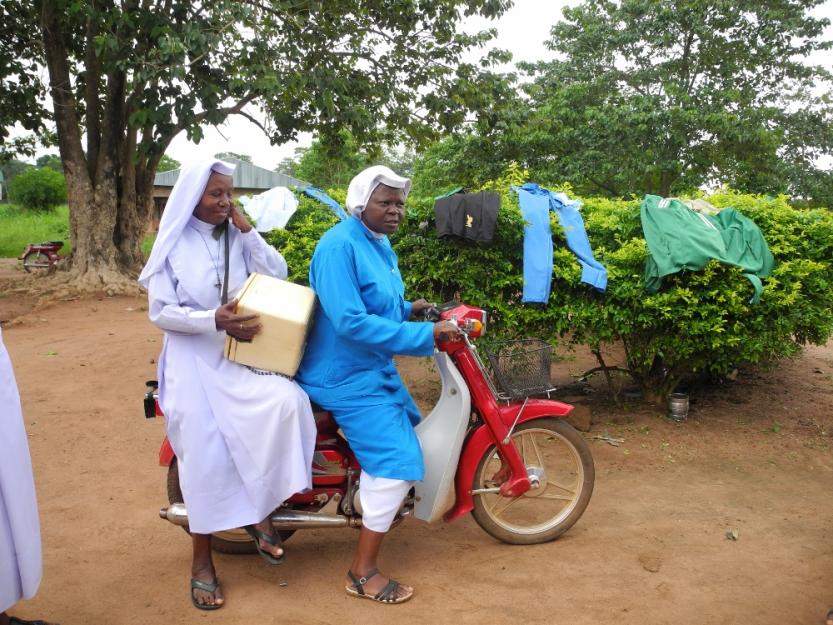 Sisters on bikes deliver healthcare where pavement ends – Another inspiring story from the GlobalSisters report.
Sisters on bikes deliver healthcare where pavement ends – Another inspiring story from the GlobalSisters report.
They say a picture is worth a thousand words.
Sisters running an isolated clinic in the Nigerian bush love to tell the story about the government doctor assigned there. He took one look at the road to his new post and got right back into his car. Or rather, he took one look at the red dirt muddy track slashed through the African jungle that served as a road and said, “No way.” Some of the villagers saw him speeding in the opposite direction and laughed.
Adaba is only about five miles from a paved road, but the isolation feels complete. For the past 20 years, a dedicated group of sisters from the Immaculate Heart of Mary congregation have run a clinic and a school for 3,000 people in surrounding villages.
But the lack of regular road is challenging for Sr. Mary Rosabel Egeobi, the hospital director, and her assistant, Sr. Mary Assumpta Ugwauanya. They had a pick-up truck in the beginning, but that broke down. So now the sisters make their rounds by foot or by motorcycle, their periwinkle habits fluttering in the wind.
“Even some Africans, they won’t come here,” said Ugwauanya. “They say, ‘Is that even a place?’”
Sr. Mary Rosabel Egeobi, the hospital director (left) and her assistant, Sr. Mary Assumpta Ugwauanya, in the main room of their clinic in the village of Adaba.
Because of the distance and the lack of roads, doctors can charge up to 15,000 naira (U.S. $93) for a visit, an unimaginable sum for villagers who are mostly subsistence farmers growing crops like maize and bananas. The sisters charge a small sum to try to cover the cost of the medicine, though some villagers can only afford to pay 10 to 50 naira (6 to 30 cents). The sisters offer pre-natal care and treat malaria, hypertension, stomach ailments and minor injuries and wounds.
Armed with a cooler containing the bare essentials, Ugwauanya and Egeobi try to visit each of the surrounding villages once every few weeks, employing a town crier to let the villagers know they are coming.
A government-run hospital four miles away opened a few years ago, but for many years the sisters offered the only medical care in the area.
“We need to educate them to come early for treatment,” explained Ugwauanya. “They try herbs and self-medication – sometimes even witchcraft, though it’s dying out.”
For example, early intervention is key for malaria, a common ailment. “Malaria is a coward; as soon as it sees a little medication it runs away, but it’s very persistent,” said Egeobi.
Motorcycles provide health workers around the world with a way to reach deep into rural villages. But the sisters pray for practical things to help their clinic improve.
“I pray government will remember this place,” said Ugwauanya, “and give us roads and light.”
These are the seven sisters of the Immaculate Heart of Mary congregation who run a school and a clinic for 3,000 people in the surrounding villages.
[Melanie Lidman is a freelance journalist based in Israel.]
Be sure to visit the Global Sisters Report for more such stories.
http://globalsistersreport.org/news/sisters-bikes-deliver-healthcare-where-pavement-ends-8001
Tags: Anti-poverty strategies, Global Sisters Report, Health, Missions
